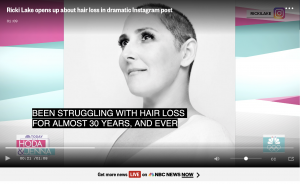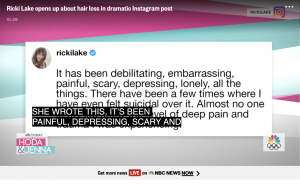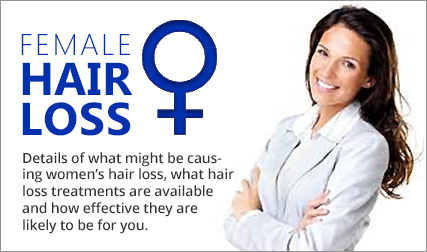Half of older women have hair loss, study finds While thinning hair in older men has been “normalized,” few women are prepared for it, experts say.
29.08.2023 in FEMALE HAIR LOSS, Latest Medical NewsMenopause isn’t just about hot flashes and night sweats. More than half of women over age 50 will experience thinning hair, a new study showed. The result can be a blow to their self-esteem.
Thai researchers, scrutinizing the scalps of nearly 200 postmenopausal women, found that 52.2 percent had some hair thinning, a condition called female pattern hair loss, according to a report published Wednesday in Menopause. Low self-esteem was found in 60 percent of participants and increased with severity of hair loss.
Researchers, led by Dr. Sukanya Chaikittisilpa of Chulalongkorn University in Bangkok, recruited 178 women who were already being seen at a menopause clinic. They measured the women’s hormone levels, as well as the density of hair in the middle of the scalp, where female pattern hair loss generally begins.
The researchers, who couldn’t be reached for comment, found that among those with hair loss, 73.2 percent had mild hair loss, 22.6 percent had moderate loss and 4.3 percent had severe loss. In addition to age, a higher body mass index was associated with an increased prevalence and worsening of the condition.
What are treatments for female hair loss?
While it’s unclear exactly why menopausal women’s hair starts to thin, the new research suggested declining estrogen levels.
“Estrogen receptors are present in the hair follicles, which hints at its association with the withdrawal of estrogen at menopause that may affect hair growth,” the researchers wrote. Other hormonal changes may affect scalp hair and accelerate the change from the growth phase to the resting phase of hair growth.
While thinning hair in an aging man has been “normalized,” few women are prepared for it, said Dr. Mary Rosser, director of integrated women’s health at the Columbia University Irving Medical Center in New York. Mothers rarely, if ever, talk to their daughters about menopause symptoms, so, for many, menopause-related hair thinning can be a shock, said Rosser, who sends her patients with hair loss to a dermatologist.
Hair loss in women may be traced to a number of factors, of which menopause may be one, said Dr. Emma Guttman, director of the Kimberly and Eric J. Waldman department of Dermatology for Mount Sinai Health System.
“There are many causes of hair loss — such as autoimmune conditions and issues with the immune system,” Guttman said. “But the hopeful thing is, there are treatments for some of them.”
Hair loss in women can occur if certain nutrients are too low, such as iron, folic acid and vitamin B, Guttman said. Also, thyroid problems can lead to thinning hair.
Even if women can’t grow back the hair they’ve already lost, there are effective ways to maintain what’s left, such as injections of vitamin B complex, biotin supplements and platelet-rich plasma injections, Guttman said.
“Hair loss is a big interest of mine because, as a woman, I feel that hair is so important for identity,” Guttman said, adding that it’s important to check with a medical doctor before trying any treatments.
Some women are able to see improvements in hair density by using minoxidil, although improvements can disappear if the hair-growth product is discontinued, Guttman said. Minoxidil is the only drug approved by the Food and Drug Administration for female pattern hair loss.
CORRECTION (Feb. 22, 2022, 4:09 p.m. ET): A previous version of this article misstated Dr. Emma Guttman’s title. She is the director of the Kimberly and Eric J. Waldman department of Dermatology for Mount Sinai Health System, not the chair of dermatology at Mt. Sinai Health System.
https://www.nbcnews.com/health/health-news/female-hair-loss-menopause-treatment-study-rcna16389
The Hair Centre is able to prescribe treatments for home use. Treatments can be purchased for use at home if desired.
Treatments are not recommended unless the Consultant Trichologist feels it is necessary or beneficial. The Hair Centre conforms rigidly to a strong ethical code.
Just click below for our Trustpilot Reviews:
https://uk.trustpilot.com/review/haircentre.co
Stay Home and Stay Safe and Protect the NHS.
Our Anti-Hair Loss Treatments are suitable for both men and women of all ages and are exclusive to The Hair Centre.
Get in touch with us today and book your Free consultation today. Call us on 0207 152 4473 today.











